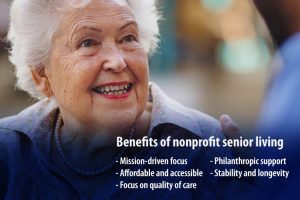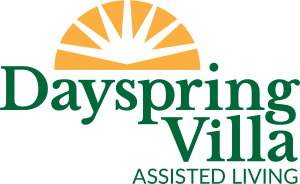When you’re looking for assisted living in Denver for yourself or a family member entering their golden years, you’ll find that every community has its unique features. But one of the most important aspects to consider is whether a community is for-profit or nonprofit. The critical differences between the two can significantly impact the quality of life of residents.
For-Profit vs. NonProfit Senior Living
For-profit communities are run with the primary goal of making a profit, while nonprofit communities reinvest their earnings back into the community. This can impact quality of care, community amenities, long-term stability, and engagement.
For-Profit Assisted Living
 For-profit assisted living refers to residential communities that provide housing, support services, and healthcare to older adults or individuals with disabilities in exchange for payment. They usually answer to stakeholders or large chains to which they belong. While some may provide high-quality services and amenities, their primary goal is to generate a profit, resulting in a more business-oriented approach to resident care.
For-profit assisted living refers to residential communities that provide housing, support services, and healthcare to older adults or individuals with disabilities in exchange for payment. They usually answer to stakeholders or large chains to which they belong. While some may provide high-quality services and amenities, their primary goal is to generate a profit, resulting in a more business-oriented approach to resident care.
Profit-driven assisted living communities, which comprise about 77 percent of assisted living, may prioritize amenities and marketing strategies to attract residents. Some critics have concerns that being motivated by profit can lead to concerns about cost-cutting measures and potential impacts on the quality of care provided.
Nonprofit Assisted Living
Nonprofit assisted living refers to residential communities that provide housing and supportive services for individuals who require assistance with activities of daily living, such as bathing, dressing, and medication management. What distinguishes nonprofit assisted living from other types of senior living is its organizational structure. Nonprofit entities operate with a mission to serve the community rather than generate profits for shareholders.
Nonprofit assisted living communities typically prioritize affordability and accessibility, seeking to enhance the well-being of residents rather than maximizing financial gains. By operating as nonprofits, these communities may be eligible for certain tax benefits and grants, allowing them to reinvest resources into improving services and maintaining a high standard of care. Their focus on social impact and community service aligns with the broader goal of addressing the needs of residents in a compassionate and financially sustainable manner.
A smaller nonprofit residence typically prioritizes resident well-being over profits. This can result in a focus on enhanced services, better staffing ratios, and improved communities. Conversely, for-profit communities aim to generate revenue, potentially leading to cost-cutting measures that impact staffing levels and service quality.
Quality of Care at Nonprofit and For-Profit Assisted Living Communities
The quality of care in nonprofit and for-profit assisted living communities can vary, but key differences often stem from their underlying mission and financial structure. Researching and visiting specific communities is crucial to assess the quality of care offered.
Nonprofit communities may emphasize a holistic approach to care, emphasizing resident satisfaction and community engagement. In contrast, for-profit communities might be driven more by market demands and profitability, potentially affecting the prioritization of resident needs. These generalizations may not hold for every community: Management, staff dedication, and regulatory compliance can all influence quality. Dayspring Villa assisted living is owned by Christian Living Communities, a nonprofit senior living organization.
Benefits of Nonprofit Senior Living
 Nonprofit assisted living offers crucial benefits by prioritizing care over profit, which can foster a compassionate environment for seniors. With a focus on affordability, these organizations strive to provide quality services, ensuring access to essential care for residents, regardless of financial constraints. Additionally, the nonprofit model often encourages community engagement, volunteerism, and philanthropy, enhancing social connections for residents. This approach fosters a sense of purpose, dignity, and well-being, creating a supportive and inclusive living environment that emphasizes the overall welfare of seniors.
Nonprofit assisted living offers crucial benefits by prioritizing care over profit, which can foster a compassionate environment for seniors. With a focus on affordability, these organizations strive to provide quality services, ensuring access to essential care for residents, regardless of financial constraints. Additionally, the nonprofit model often encourages community engagement, volunteerism, and philanthropy, enhancing social connections for residents. This approach fosters a sense of purpose, dignity, and well-being, creating a supportive and inclusive living environment that emphasizes the overall welfare of seniors.
Nonprofit senior living organizations, such as nonprofit senior housing or assisted living communities, offer several benefits compared to their for-profit counterparts. The following are some potential advantages:
1. Mission-Driven Focus
Nonprofit senior living organizations typically aim to provide quality care and services to seniors. Their primary goal revolves around the well-being of residents rather than generating profits for shareholders.
2. Community Engagement
High-quality care for assisted living residents goes beyond medical care. Life enrichment is an essential aspect of well-being for older adults. Nonprofits often have strong ties to the community and may be more integrated into local networks. This can foster a sense of community and support for seniors and encourage community involvement and volunteerism.
3. Affordability and Accessibility
Some nonprofit communities are eligible for government grants because they work toward furthering a cause or other public benefit. This status means these organizations can often accept donations from various sources, giving them the flexibility to provide additional support to residents. Nonprofits may be more inclined to use their resources to keep costs reasonable for residents. This commitment to affordability can make assisted living options more accessible to a broader range of seniors, including those with limited financial means.
4. Stability and Longevity
Nonprofit organizations often have a long-term perspective and may be more resilient during economic downturns. This stability can contribute to a more reliable and consistent level of care for seniors.
5. Philanthropic Support
Nonprofits can seek philanthropic support from individuals, foundations, and businesses. Communities can use this additional funding to enhance services, improve facilities, and provide extra amenities for seniors.
6. Focus on Quality of Care
With a mission-oriented approach, nonprofit senior living organizations may emphasize providing high-quality care and services. This can lead to a more person-centered approach that prioritizes the well-being and satisfaction of residents. Since for-profit organizations focus on profits, they may sacrifice patient care to save money by having fewer healthcare professionals on their staff. At a nonprofit community, you can rest assured that the amount you spend will go directly to paying the salaries of the healthcare providers who take care of your loved one. At Dayspring Villa the residents are cared for not just physically, but mentally, emotional, and spiritually in accordance with the Eden Alternative.
7. Innovative Programming
Nonprofits may be more flexible and innovative in designing and implementing programs and services to meet the unique needs and preferences of their residents. This can result in a more personalized and enriching experience for your loved one in the community.
8. Ethical Considerations
 Some people prefer supporting or living in a senior living community that operates on ethical principles rather than purely for profit. Nonprofit organizations may be more committed to ethical practices and resident well-being. Run by a board of directors, nonprofits seek compassionate members who listen to resident input and form relationships with local businesses and organizations to ensure residents remain connected with the broader community.
Some people prefer supporting or living in a senior living community that operates on ethical principles rather than purely for profit. Nonprofit organizations may be more committed to ethical practices and resident well-being. Run by a board of directors, nonprofits seek compassionate members who listen to resident input and form relationships with local businesses and organizations to ensure residents remain connected with the broader community.
As always, prospective residents and their families should thoroughly research and visit communities to ensure they align with their values and expectations.
Find Nonprofit Assisted Living in Denver
Learning the differences between for-profit and nonprofit assisted living communities is key when seeking the best care for you or your loved one. These two types of organizations vary structurally, with nonprofit communities providing a variety of benefits for their residents. To learn more about nonprofit care at Dayspring Villa, contact us today.



